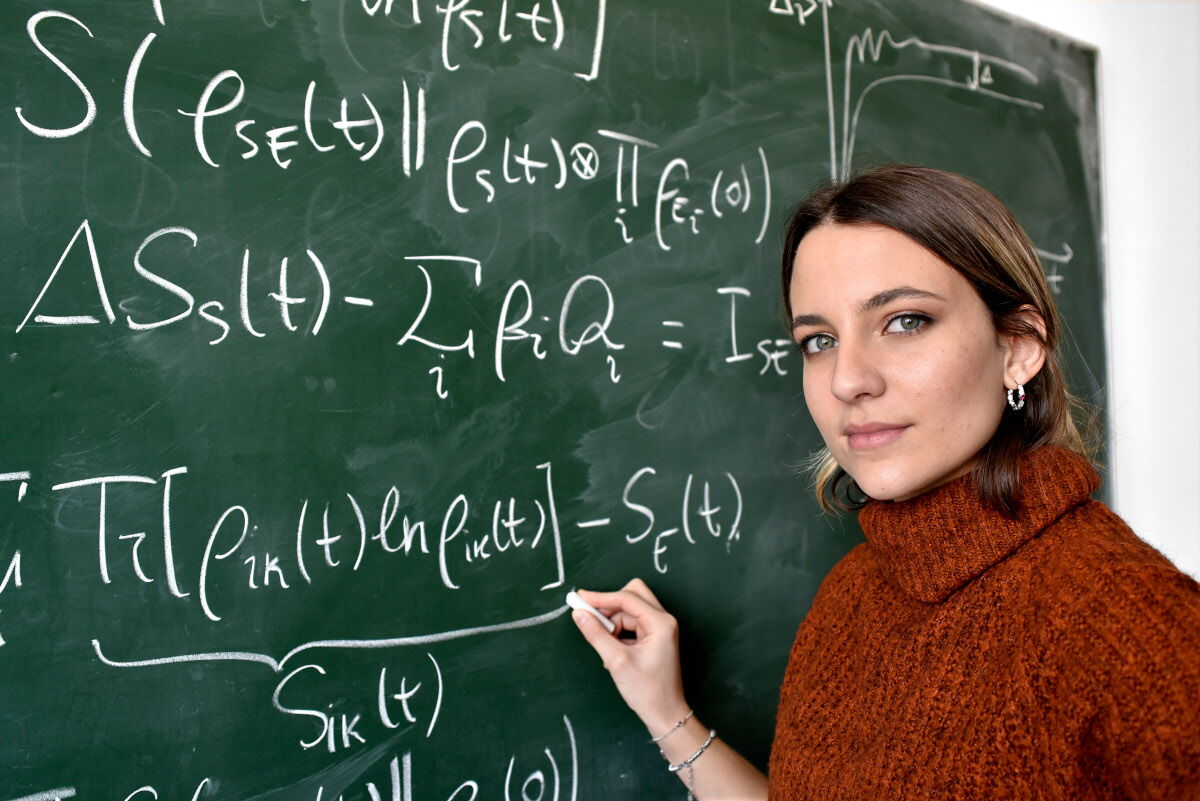#QUSTEC Portrait: A European doctoral degree

Alessandra Colla is a European Campus doctoral candidate working on a dissertation in quantum physics. The Freiburg physicist is participating in the program ‘QUSTEC – Quantum Sciences and Technologies at the European Campus’. For her dissertation the 26 year old is researching irreversibility and entropy production in quantum non-equilibrium systems, which involves her investigating essential questions of quantum science.
You can tell straight away that Alessandra Colla has put herself heart and soul into this basic research. “I’m convinced that this is where the roots of our technological progress lie. We must discover and research the fundamental principles in order to use them for practical applications such as in the design of efficient quantum thermodynamic machines,” says Colla. It is no surprise that after completing her Master in Theoretical Physics at the University of Padua in Italy and taking her first steps in professional life, Colla decided to return to research, choosing to take a doctorate in another European country in order to increase her international experience.
Developing efficient technology
Alessandra Colla has been living and researching in Freiburg since March 2020 and is part of the QUSTEC doctoral program. QUSTEC is affiliated to Eucor – The European Campus and aims to attract junior researchers who like Colla are intensively engaged with the principles and potential uses of quantum science. It is seen as a beacon of hope in many areas. “Quantum science provides the most fundamental theory of physical phenomena. It uses novel ideas and concepts which often elude any intuitive explanation,“ Colla says. “These ideas offer a great potential for applications in many fields, such as quantum computation, secure cryptography, simulation and control of complex materials and chemical reactions, and quantum metrology.”
For her dissertation Alessandra Colla is investigating irreversibility and entropy production in quantum non-equilibrium systems. “In the principles of classical thermodynamics, entropy is a measure of the level of uncertainty about the state of a specific physical system or the degree of disorder in this system,” she explains. “Although entropy production is well defined in classical thermodynamics it’s extremely difficult or even impossible to determine it in complex open systems in the quantum regime.”
So Colla’s goal is to develop efficient techniques that can be used to obtain entropy production in quantum systems that are far removed from thermal equilibrium. In order to deliver better forecasts of the behavior of complex physical systems, the doctoral candidate’s work includes analytical calculations and computer simulations. She is endeavoring to link concepts and methods from different fields – on the one hand from non-equilibrium thermodynamics, and on the other from classical and quantum information theory. “It’s a fascinating and challenging aspect of my work.”
Extensive exchange of knowledge
Explaining why she applied for one of the 39 doctoral posts, the native Italian says: “QUSTEC advertised a project which fitted very closely with my academic career. I also liked the interdisciplinary focus of the program and the fact that QUSTEC unites young scientists from universities in France, Switzerland and Germany.” She finds contact with researchers from other disciplines important to broadening her professional horizon, and it enables her to keep an eye on projects and developments in other fields. Alessandra Colla values the fact that QUSTEC promotes more than just technical skills: “Amongst other things we’re trained in how to use research data and learn about cooperating with a large group of people and organizing events.”
In these days of coronavirus, working together frequently means video chat and online conferences. Because of the pandemic, every meeting that was planned has so far had to take place digitally – this was also the case for the three-day event to launch the QUSTEC program. Although the digital exchange of ideas works better than expected, she hopes to get to know her QUSTEC colleagues in person soon and learn even more about their projects, recalls Alessandra Colla, who has largely worked from home over the past few months. “Even though I am doing a job which allows me to work from home quite well, I think I have been affected by the restricted communication with my colleagues. Not just from QUSTEC, but especially the people in my group here in Freiburg. For me talking and discussing physics is important to work efficiently.”
Kristin Schwarz